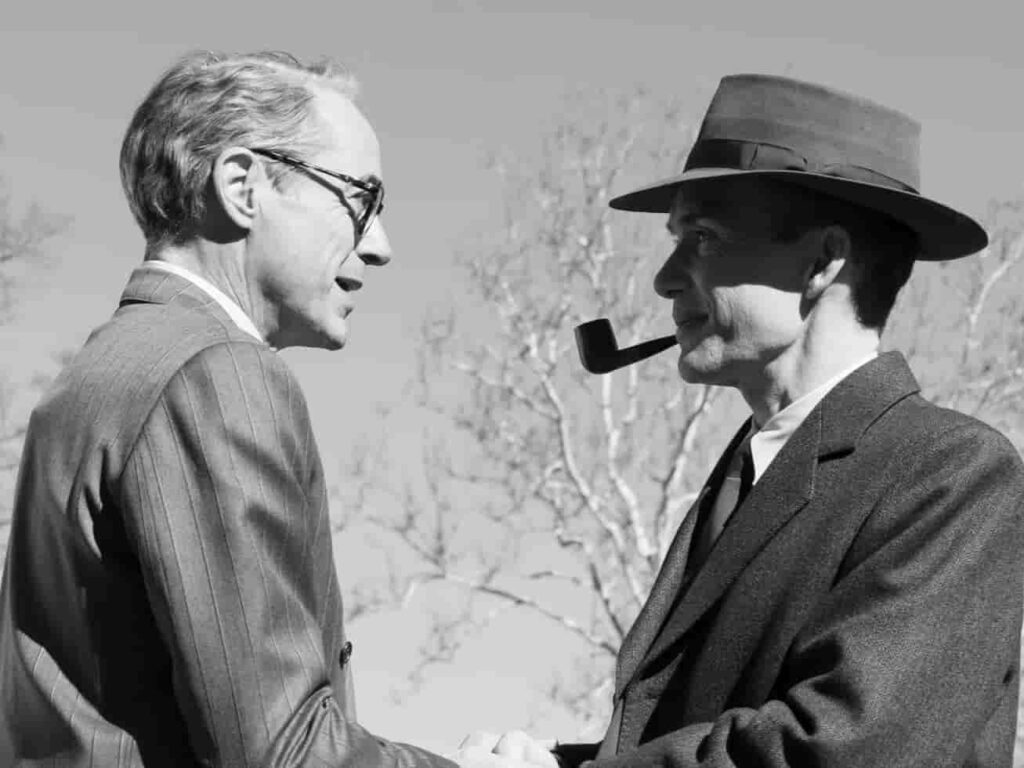Explore the complex relationship between Einstein and Oppenheimer in historical context. Discover the truth behind the cinematic portrayal.

Exploring the Complex Relationship Between Einstein and Oppenheimer
The portrayal of historical figures in films often takes creative liberties to craft compelling narratives. One such instance is Christopher Nolan’s movie “Oppenheimer,” which delves into the life of renowned physicist J. Robert Oppenheimer and his pivotal role in the development of the atomic bomb. Central to the film’s narrative is Oppenheimer’s relationship with another iconic figure of science, Albert Einstein. While the movie presents their bond as crucial to the plot, it diverges from historical reality, particularly in depicting Einstein’s feelings towards Oppenheimer.
Setting the Scene: Oppenheimer and Einstein on the Silver Screen
In “Oppenheimer,” Cillian Murphy portrays Robert Oppenheimer, while Tom Conti embodies Albert Einstein. The film portrays their relationship as pivotal, shaping Oppenheimer’s trajectory and the overarching themes of the narrative. However, historical records reveal a more nuanced and complex dynamic between the two scientists, one characterized by divergent personalities and ideological differences.
Also Read:- Zendaya’s Fashion Triumph: A Knightly Elegance at the Dune 2 London Premiere
Einstein’s Discontent: Unveiling the Historical Reality
Contrary to the film’s narrative, Albert Einstein did not hold a favorable view of J. Robert Oppenheimer. Their strained relationship can be attributed to various factors, including personality clashes and conflicting scientific beliefs. Einstein, a staunch pacifist, harbored reservations about Oppenheimer’s collaboration with the United States government, particularly in the development of nuclear weapons.
Personal Differences: Einstein’s Perspective
Einstein’s disdain for Oppenheimer was rooted in their disparate personalities and approaches to science. While Oppenheimer was known for his assertiveness and dominance, Einstein found his teaching methods overbearing. In his correspondence, Einstein likened Oppenheimer’s commitment to government work to unrequited love, suggesting a sense of disappointment in his colleague’s choices.
Ideological Divide: Einstein’s Pacifism vs. Oppenheimer’s Pragmatism
The ideological gap between Einstein and Oppenheimer further strained their relationship. As a committed pacifist, Einstein regretted his involvement in advocating for the development of atomic weapons, viewing it as a betrayal of his principles. In contrast, Oppenheimer’s pragmatic approach led him to collaborate with the government, viewing the atomic bomb as a necessary evil in the context of World War II.
Also Read:- Kristen Stewart Claps Back at Trump in Explosive Interview: From Cheating Scandal to ‘F— you, bitch!’
Scientific Disparity: Divergent Views on Nuclear Physics
Another point of contention between Einstein and Oppenheimer was their differing scientific perspectives, particularly regarding nuclear physics. Einstein, known for his contributions to theoretical physics, held reservations about the feasibility and consequences of nuclear fission. Oppenheimer, on the other hand, embraced the emerging field of quantum mechanics and played a pivotal role in harnessing nuclear energy for military purposes.
Historical Context: Oppenheimer’s Evolution and Einstein’s Legacy
While the film portrays Oppenheimer and Einstein as contemporaries engaged in intellectual discourse, their real-life interactions were less harmonious. Despite their differences, both scientists left indelible marks on the scientific landscape. Oppenheimer’s contributions to the Manhattan Project and subsequent reflections on the implications of atomic warfare shaped the course of history. Meanwhile, Einstein’s legacy as a pioneer of modern physics endures, transcending his disagreements with colleagues like Oppenheimer.
Conclusion: Navigating the Intersection of History and Fiction
In reimagining the relationship between Einstein and Oppenheimer, “Oppenheimer” offers a cinematic interpretation of historical events. While the film takes liberties to craft a compelling narrative, it prompts audiences to explore the complexities of human relationships and the ethical dilemmas inherent in scientific advancements. By delving into the lives of these iconic figures, viewers are invited to reflect on the intersections of science, morality, and legacy in the tumultuous backdrop of the 20th century.
